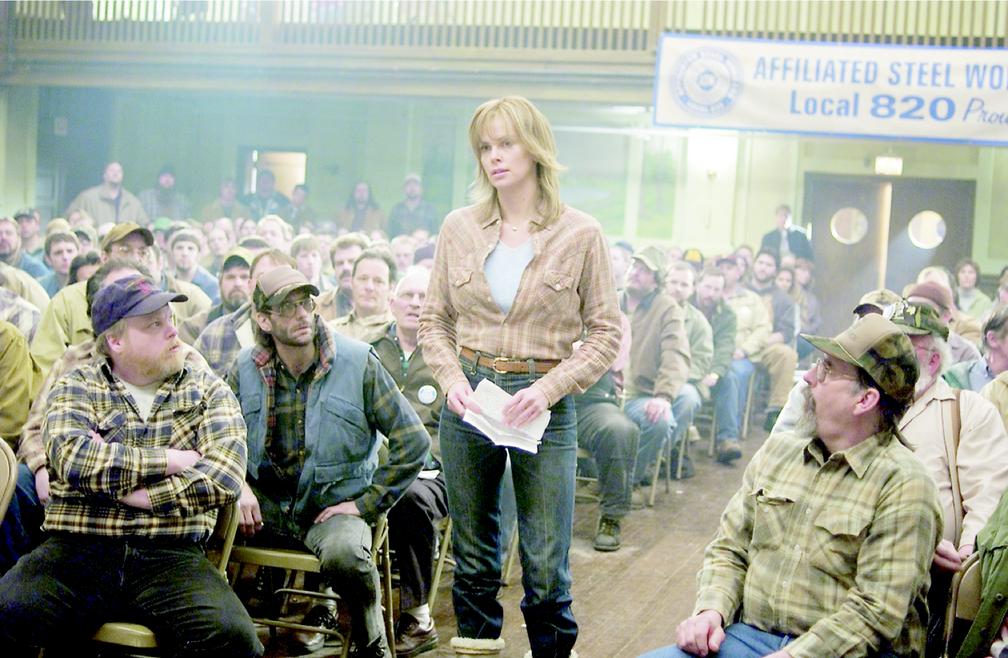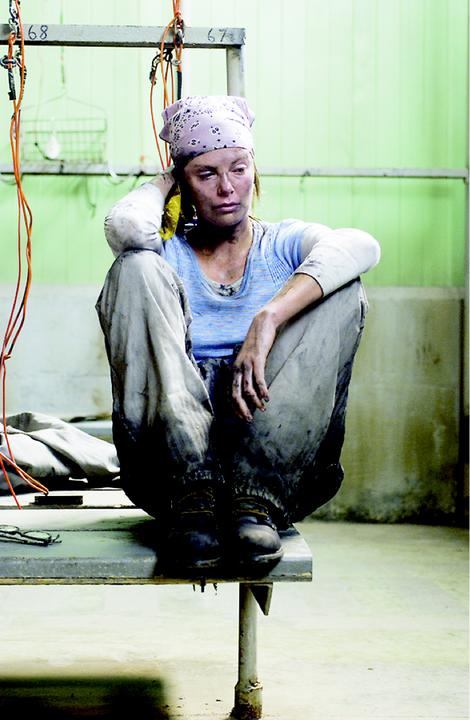Admittedly, the subject matter sounds like a big load of legalese sandwiched between two dry crackers, but Caro and her compatriots have crafted it into an emotional think piece about a woman trying to scratch out her own small place in a traditionally male environment. Substituting the justice system of America for the magic of New Zealand, it's more or less a sister piece to Whale Rider.
Theron–having nothing to prove after Monster, but proving it anyway with a tough, nuanced performance–plays our heroine, Josey. Young, the mother of two and stuck in an abusive relationship, Josey makes a tough decision and leaves her husband to move back in with her parents (Sissy Spacek and Richard Jenkins) in rural Minnesota. Though her parents are typical, loving, salt-of-the-earth folks, they encourage her to move back in with her slaphappy husband. After all, how is she going to take care of herself and two kids?
Relief comes at the suggestion of Josey's old friend Glory (Frances McDormand), who works at the local iron mining company. Strapping on a hard hat and some overalls, Josey lands a job at the mine herself, touching off the resentment of her father–who, like most of the locals, believes that womenfolk are emasculating the men by “stealing” jobs from hardworking, penis-wearing inebriates.
For the first time in her life, Josey is standing on her own two feet, making good money and providing a humble home for her two kids. Unfortunately, the local, hockey-worshipping good old boys don't take kindly to all these newfangled gals in the workplace. The iron mine is a hotbed of torture and harassment for the women on staff. Most of the ladies have learned to ignore it, Glory has developed a “one of the boys” technique for avoiding it, but newcomer Josey is overwhelmed by it. Confronted by crude suggestions, blunt threats, borderline assaults and rivers of human excrement at every turn, Josey hits her breaking point. Demeaned and dismissed by upper management, Josey decides to sue the company.
She talks a local hockey hero-turned-lawyer (Woody Harrelson) into taking the case. Of course, a class action suit requires multiple plaintiffs, and our heroine's biggest battle is in convincing her coworkers to come forth. Most are resigned to living under the “shut up and take it” policy. Stuck in such lousy economic conditions, these women can ill afford to rock the boat that pays their salaries.
The screenplay by Michael Seitzman nicely distills the literary source material, Class Action: The Landmark Case that Changed Sexual Harassment Law, into a tight, personal drama. The film flips back and forth in time, setting up Josie's predicament and touching on key arguments in the resulting trial. Thankfully, the film avoids becoming a courtroom drama and spends most of its time out in the real world. Some deftly handled personal issues crop up late in the game to give Josey even more tension to deal with. Scenes with her family–her disgruntled teenage son in particular–give the film a deeply personal edge, and point out the human cost of such cage-rattling undertakings.
Toward the end, the film flirts with becoming your standard stand-up-and-cheer drama. Aside from a too tear-jerky character arc for Frances McDormand's character, however, the film keeps everything on a fairly even emotional keel.
Admittedly, the subject matter isn't a terribly pleasant one. The film certainly paints a vivid picture of this overwhelmingly hostile workplace. Working in a mine seems about as appealing as working in your average federal prison. As nasty as some of these mine-workers are made out to be, Caro still believes that good will triumph over bad. Granted, she is more delicate in sketching out the heroes than the villains. Minnesotans probably won't be too happy with this portrait of a state filled to bursting with leering Neanderthal rapists. But, as she demonstrated in Whale Rider, Caro is a deeply humanist filmmaker. In the end, we see that basic human compassion wins out over institutionalized hate.
It's scary, of course, to think that we live in a country where laws must be passed to ensure basic human decency toward one another. North Country, therefore, serves as a sobering reminder at the often cruel things we do to one another and the simple strength it takes to fight for what is right.




